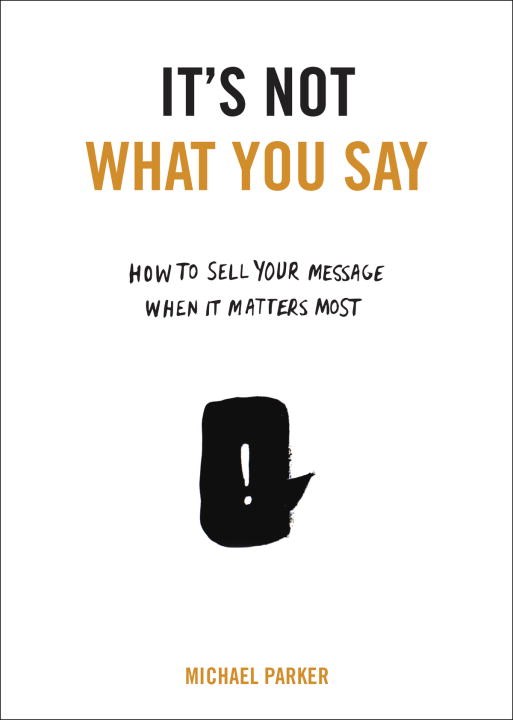It's Not What You Say: How You Sell Your Message When It Matters Most
December 23, 2015
Pitch coach Michael Parker teaches how to sell our message, and ourselves, most effectively.

It’s Not What You Say: How You Sell Your Message When It Matters Most by Michael Parker, Perigee, 160 pages, $15.95, Paperback, Decmember 2015, ISBN 9780399175435
The first thing you notice about It’s Not What You Say is that it’s an attractive little book. It is heavily illustrated, with an illustration of some kind on nearly every page. And that, to a degree, bears out the message:
When faced with the spotlight, most of us tend to focus on the content—the what we say—at the expense of the delivery—the way we say it. That is the difference between mediocre speakers and great ones.
Make no mistake… the content of the book is clear, concise, and practical, but the design and presentation of it seem easy and inviting, taking you in and pulling you through as any good speech would. The book is also peppered with quotes ranging from Aristotle and Quintilian to Maya Angelou, Hillary Clinton, and Norman Schwarzkopf. What that range of characters demonstrates is the breadth of the book, because even though it is a rather slim volume and the content is highly stylized, it is also quite serious, diving into 2,000-year-old canon of rhetoric and using it to buttress the best practices of today.
It’s Not What You Say actually pairs very well with the book we covered in this space last week, Amy Cuddy’s Presence. But, whereas Cuddy is an academic and the tone more scholarly, Parker is the former vice chairman of Saatchi & Saatchi London, and his approach is more hands-on, straightforward, and “how-to.” (His day job these days is coaching private clients on pitches, so he knows what he’s doing.) Both books are about how to best present yourself to others, and both authors stress the importance of being there not only to get your own point across, not only for yourself, but for your audience—whoever that may be. To make an impact, you must be attentive to their needs, and in tune with them. As he succinctly put it: “People listen to you if you listen to them.” I think one of the reasons the book is so slim is that it is so succinct (again, practicing what he's preaching). And the quotes he shares reinforce what he is saying quickly, as well. In this case, he uses Jimi Hendrix:
Knowledge speaks, but wisdom listens.
We can get so caught up in the point we’re trying to make, and the anxiety of our own delivery, that it’s easy to forget that. We must try to understand what is in it for our audience, and that we are there only because they are there, whether we’re on stage in front of 100 people or across the desk pitching ourselves for a job.
We have to know and empathize with their needs on order to engage them emotionally, and if we can engage them emotionally we will have done more than we can with any argument, because:
We forget that emotion leads to action, whereas reason just leads to conclusions. We forget about feelings.
So, although honing our arguments and perfecting our elevator pitch is important (more on that in a minute), we must also make room and provide time to put our heart into it, to put passion behind our words. You can’t do that in the same way from a stage as you can across a desk, but Parker has sections on each circumstance, and shares universal tools to perform well in any circumstance. He will show you how to blueprint a presentation, and how to structure a speech, always making sure to rely on the rules of three and close with emotion appeal. He tells of the importance of finding someone neutral to judge your performance as you rehearse it. He will teach you how to best prepare for an interview, and how to be your best self when you arrive.
And, as it did with Amy Cuddy’s story last week, it often comes down to an elevator pitch, and how well you can give it—though Parker will tell you it is not only important for an elevator (or other quick pitch occasion). He counsels that “Even if you are going to talk for an hour or more, the essence needs to be captured in order to set up what you will develop and embellish later on.” He suggests getting down to fifty words, and practicing what he preaches throughout the book, he delivers one for the book:
Based on the experience of 1,000 pitches, this book contains a constant source of ideas and inspiration to help you perform at your best and be a winner when it really matters.
He got it down in 32 words. And I don’t have any more to add.

